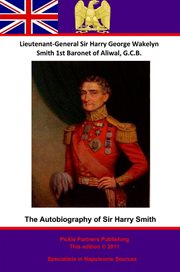Nonfiction
eBook
Details
PUBLISHED
DESCRIPTION
1 online resource
ISBN/ISSN
LANGUAGE
NOTES
This ebook is purpose built and is proof-read and re-type set from the original to provide an outstanding experience of reflowing text for an ebook reader. The autobiography of Sir Harry Smith, 1st Baronet of Aliwal, is as exciting, varied and adventurous as the epic life that he led. He joined the British army in the 1st battalion of the 95th Rifles, whose dark green uniform he was proud to wear and despite an inauspicious posting along with the disastrous expedition to Montevideo in 1807 his talents began to emerge. These talents were to be brought to bear on three other continents in the service of the British. A contemporary of, and good friend of, other famed writers of the Rifles, such as Sir John Kincaid, Major George Simmons, and Jonathan Leach. These characters appear in their varied guises throughout the narrative to give it a distinctly Rifle Brigade feeling. The autobiography was originally published in two parts, however in terms of phases or major periods of his life it is best to describe them in three distinct eras; The Napoleonic Period covers Sir Harry's career in the 95th through-out the Peninsular War, fighting in the Light Division from victory to victory. His Peninsular Medal , when issued in 1847, came with 12 clasps: Coruna, Busaco, Fuentes d'Onoro, Ciudad Rodrigo, Badajoz, Salamanca, Vittoria, Pyrenees, Nivelle, Nive, Orthez, Toulouse to represent the hard fought and glorious victories he had participated in. However perhaps his most fortuitous discovery during this period was Juana, his wife who having seen all here property destroyed in Badajoz came to the British lines to seek protection. Sir harry also participated in the Waterloo campaign in 1815 and provides a number of vivid anecdotes and flashes of action. The second period was in the emergent British Empire in India, where he trained and fought alongside native forces in the First Anglo-Sikh war. His victory at Aliwal on the Sutlej, in which he was outnumbered almost two to one, is widely regarded as the turning point of the war and led to further expansion what would become the Raj
Mode of access: World Wide Web







